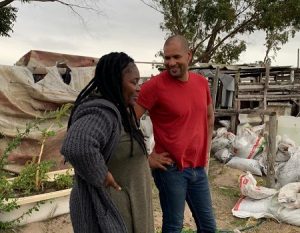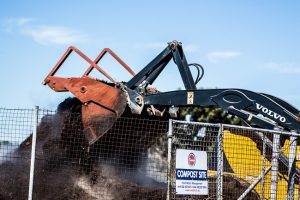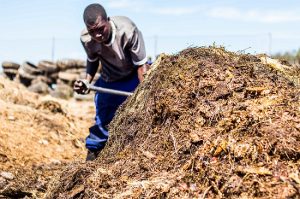GREEN HOME Interviews: Emile Fourie – Industrial Composter

Emile Fourie became an entrepreneur because he saw a flawed system and wanted to do something about it. His company, YWaste, offer a green alternative to landfill which includes a composting service.
Emile tells us he’s trying to create a better existence. And he knows that to create change within his chosen arena, the waste sector, he needs to shift mentalities and behaviour. Building a better system means getting people to think and act differently when it comes to their trash. It means building awareness around how and what we throw away.
We sat down with Emile to find out what makes him tick and learn more about YWaste. We also knew he could help demystify industrial composting for our audience. The word ‘industrial’ in front of the word ‘composting’ seems to throw a lot of people off, but it’s actually very simple.
From Swimming Teacher to Industrial Composter
A decade ago, back in 2009, Emile began what he calls his research and development phase into composting. While working as a swimming teacher for kids, he started making worm farms on Friday afternoons, which he sold at a Saturday market.
Ten years later, his composting operation has grown exponentially. YWaste manages waste for numerous clients and prevents more than 1500 tons of organic waste from going to landfill annually.
The company divert an impressive 90-95% of the waste they process from landfill. They provide a service where waste is either collected or dropped off and all organic waste, including compostable packaging, is composted. They also have a waste separation plant, where organic waste wrapped in non-compostable plastic can be depackaged for composting. All recyclable waste is recycled with local recyclers.
Treat Your Compostable Packaging Just Like Food Waste
We asked Emile how people should handle their organic waste and compostable packaging when using his service:
“Combine it all in one bin.”
He says people should see compostable packaging as an organic material, like a potato peel or tomato skin. He treats them the same, it’s all part of the same organic waste stream. Having a dedicated bin for all your organic waste and keeping it separate from recycling and landfill waste, obviously makes the process easier.
What is Industrial Composting?
Industrial composting is at the heart of the YWaste solution, so we asked Emile for his definition:
Emile: It means composting waste on an industrial, not a residential, scale.
GREEN HOME: We’ve always thought of it as piles that are big enough to need machines to turn them.
Emile: Not necessarily. You could have a long windrow which a group of people turn by hand. It’s really all about scale.
And there you have it from a man in the know. Industrial composting is simply composting on a large scale. Think big compost piles and big volumes. Machinery can be used but isn’t essential at all.
Growing Skills
Emile goes on to say that in South Africa we need more industrial solutions which are less automated. He highlights how this represents a huge opportunity to integrate skills into business while creating jobs. It’s a way to pull people out of poverty. Over time, workers can move up the skills chain, taking on increasing responsibility.
Emile has implemented this in his own business. While he does use some machinery, he also applies low automation approaches. And he encourages employees to up-level their skills to the point where they are skilled enough to start their own operations.

He also feels there is scope to replicate the YWaste business model in different communities. The model can simply be adapted to suit the needs of the people using it. He sees potential for composting to exist in the informal economy, providing waste management solutions for informal settlements. Service delivery in informal settlements is poor and many receive little to no waste management services.
Emile’s vision includes finding integrative solutions for waste management in informal settlements by engaging with community members to find integrative solutions. He believes the YWaste model can be adapted to provide them with essential and much needed services, with community ownership.
Green Jobs, and a Lower Carbon Footprint
Emile’s vision makes a lot of practical sense within the South African context. There is enormous scope for composting to grow in South Africa. And this is a massive opportunity to create green jobs and develop skills.
At the same time, this can significantly help alleviate our landfill crisis – we are rapidly running out of landfill space and close to 40% of the waste we send to landfill is compostable organics. This organic waste rots and releases methane, a powerful greenhouse gas, while it sits in landfill, so diverting and composting it will lower our country’s carbon footprint.
It all comes down to what Emile told me at the start of our conversation: he’s trying to create a better existence and fix a broken system.
It’s a vision that’s very in-line with our vision at GREEN HOME. We know there’s a much better way to do things, both when it comes to using packaging and managing our waste. But to bring about transformation and realize the benefits of a better system, we must act. We are the agents of change.


